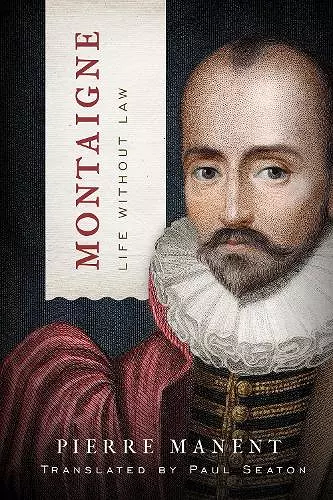Montaigne
Life without Law
Pierre Manent author Paul Seaton translator
Format:Hardback
Publisher:University of Notre Dame Press
Published:31st Aug '20
Should be back in stock very soon

In Montaigne: Life without Law, originally published in French in 2014 and now translated for the first time into English by Paul Seaton, Pierre Manent provides a careful reading of Montaigne’s three-volume work Essays. Although Montaigne’s writings resist easy analysis, Manent finds in them a subtle unity, and demonstrates the philosophical depth of Montaigne’s reflections and the distinctive, even radical, character of his central ideas. To show Montaigne’s unique contribution to modern philosophy, Manent compares his work to other modern thinkers, including Machiavelli, Hobbes, Pascal, and Rousseau. What does human life look like without the imposing presence of the state? asks Manent. In raising this question about Montaigne’s Essays, Manent poses a question of great relevance to our contemporary situation. He argues that Montaigne’s philosophical reflections focused on what he famously called la condition humaine, the human condition. Manent tracks Montaigne’s development of this fundamental concept, focusing especially on his reworking of pagan and Christian understandings of virtue and pleasure, disputation and death. Bringing new form and content together, a new form of thinking and living is presented by Montaigne’s Essays, a new model of a thoughtful life from one of the unsung founders of modernity.
Throughout, Manent suggests alternatives and criticisms, some by way of contrasts with other thinkers, some in his own name. This is philosophical engagement at a very high level. In showing the unity of Montaigne’s work, Manent’s study will appeal especially to students and scholars of political theory, the history of modern philosophy, modern literature, and the origins of modernity.
"Pierre Manent’s monograph on Montaigne . . . is brimming with the considerable erudition for which Manent is justly famous as a philosopher and public intellectual in France. Manent performs a virtuoso close reading of the Essays, taking readers on a thrilling ride through many of the twisting thematic turns, cheerfully unexplained self-contradictions, and dramatic changes of subject that have drawn readers to Montaigne for centuries. Paul Seaton, the translator, has done a masterful job capturing Manent’s gripping prose." —Perspectives on Politics
"Paul Seaton’s fine translation captures the subtlety and elegance of Manent’s argument, and his introduction locates this work within Manent’s understanding of the origins of modernity. In bringing the subject to light, Pierre Manent has given us profound insight into the meaning of the Essays and the importance of Montaigne for our understanding of ourselves as we are in this moment of the Western dynamic." —The Review of Politics
“Manent continues his impressive political and philosophical efforts to reconnect human liberty with natural law, practical reason, and the moral contents of life. This is moral and political philosophy of a very high order, and of great and enduring relevance.” —The New Criterion
“In a long line of essential books, Manent has built his reputation as Europe’s principal chronicler of Western political thought. His latest, Montaigne: Life without Law explores how Michel de Montaigne (1533–1592) helped shape the Western belief that it is the law that obeys us, not the other way around.” —Law and Liberty
"Pierre Manent's Montaigne is an extraordinary book. It stands out brilliantly among works in the history of ideas in form and in content." —Ralph C. Hancock, author of Calvin and the Foundations of Modern Politics
"Pierre Manent shows repeatedly how Montaigne's views have come to inform much of what we take for granted in modern life. To know ourselves, we must know Montaigne. Manent proves an invigorating and sure guide." —Thomas Hibbs, author of Wagering on an Ironic God
"Montaigne: Life Without Law may have been written primarily with professional philosophers in mind, but in spite of its at times demanding character, it is accessible to the informed layman. Manent is not writing in a vacuum; his Montaigne offers many lessons for our troubled present." —Review of Metaphysics
ISBN: 9780268107819
Dimensions: 229mm x 152mm x 18mm
Weight: unknown
280 pages